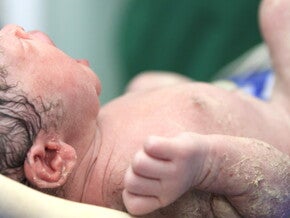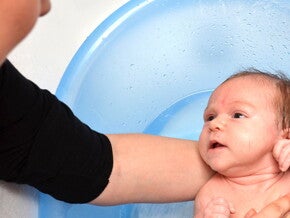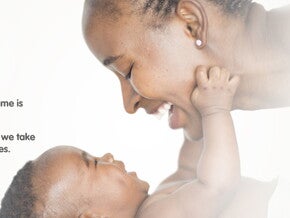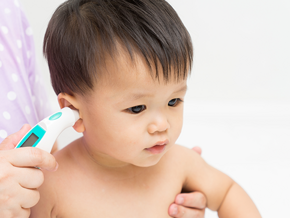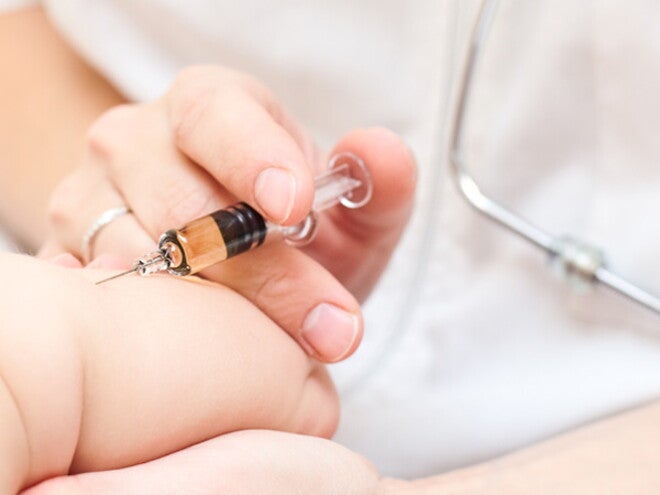
- Keep your child’s immunisation details up-to-date and her health record card safe. Schools require proof of your child’s full immunisation schedule.
The Expanded Programme on Immunisation (EPI) of the World Health Organisation (WHO) is a global programme implemented in most countries of the world. It has been adopted by the Department of Health and is called EPI-SA.
Routine immunisation schedule
It is important for your child to receive immunisation before exposure to a disease, but after the level of antibodies
the child received from the mother is sufficiently low, as this interferes with the effect of vaccines.. Immunisation at an early age has been shown to be effective. Giving vaccines early in life reduces the risk of succumbing to the disease when the risk of dying from the disease is greatest.
Premature infants should be vaccinated in the same way as full term infants: same dose at the same age (e.g. 6 weeks dose when a premature infant is 6 weeks old from birth).
Schedule for childhood immunisation – EPI-SA
| Age | Vaccine |
| Birth | TOPV (0), BCG |
| 6 weeks | TOPV (1), RV (1), DTaP-IPV//Hib (1), Hep. B (1), PCV ₁₃ (1) |
| 10 weeks | DTaP-IPV//Hib (2), Hep. B (2) |
| 14 weeks | RV (2), DTaP-IPV//Hib (3), Hep. B (3), PCV ₁₃ (2) |
| 9 months | MEASLES (1), PCV ₁₃ (3) |
| 18 months | DTaP-IPV//Hib (4), MEASLES (2) |
| 6 years (school entry) | Td |
| 12 years (school leaving) | Td* |
- Do not administer any dose of Rotavirus to a child that is more than 24 weeks.
- Rotavirus Vaccine first dose can be given to children older than 12 weeks but younger than 20 weeks.
- Do not give OPV from 10 weeks of age, (OPV is given at birth & six weeks only).
| TOPV | Trivalent Oral Polio Vaccine |
| RV | Rotavirus Vaccine |
| DTaP-IPV//Hib | Diphtheria, Tetanus, acellular Pertussis, Inactivated Polio Vaccine, Haemophilus influenzae type b |
| Hep. B | Hepatitis B Vaccine |
| BCG | Bacillus Calmette Guerin (Anti-tuberculosis Vaccine) |
| PCV | Pneumococcal Conjugated Vaccine |
| Td | Tetanus & reduced strength Diphtheria Vaccine |
Route, dose and recommended site of administration of vaccine
| Vaccine | Form or presentation | Dose | Preferred route | Recommended site | Age |
| BCG | Powder | 0,05 ml | Intradermal | Right upper arm, at the deltoid muscle | Birth |
| TOPV | Liquid | Two drops | Oral | Oral | Birth & 6 weeks |
| RV | Liquid | 1,5 ml | Oral | Oral | 6 &14 weeks |
| Hep. B | Liquid | 0,5 ml | Intramuscular | Lateral aspect of the right thigh in infants under one year | 6, 10 & 14 weeks |
| DTaP-IPV//Hib | Liquid and Powder | 0,5 ml | Intramuscular | Lateral aspect of the left thigh in infants under one year | 6, 10 & 14 weeks 18 months |
| Measles | Powder | 0,5 ml | Intramuscular | Lateral aspect of the left thigh | 9 & 18 months |
| PCV | Liquid | 0,5 ml | Intramuscular | Lateral aspect of the right thigh | 6 & 14 weeks 9 months |
| Td | Liquid | 0,5 ml | Intramuscular | Left arm | 5-7 years (school entry) 12 and older (school leaving) |
Special Note
For BCG, the recommended site is the right upper arm at the insertion of the deltoid.
For DTaP-IPV//HiB, Measles and Hep. B the recommended site is the lateral aspect of the thigh in infants under one year. The deltoid is preferred in children over one year.
Summary of the routine immunisation schedule by vaccine and age
Possible reactions
- Children rarely have a reaction after immunisation. They normally have a short cry, a long sleep and are fine by the next morning.
- There can be a measles-like reaction 7–10 days after the measles immunisation. The reaction is mild and will pass – it is not infectious.
Contraindications for immunisation
- A baby with a history of convulsions will not be immunised against whooping cough.
- A baby with eczema on the immunisation site or a bad rash will not be given the BCG vaccine.
- Wait for all signs and symptoms of high temperature, diarrhoea or vomiting to clear before immunising.
- A child on long-term medication must have written permission from the doctor to be immunised.
- An upper respiratory tract infection is not a contraindication on its own. Allow the doctor or sister to make the decision whether to immunise.
Do not try to treat your baby yourself
When to call a doctor
Parents are usually anxious about their baby and worry about her constantly. Once you are used to handling your baby, you will intuitively know when she is ill. Phone your doctor to let him know what is wrong – doctors are used to anxious parents!
Infections in your newborn baby are serious and need prompt attention. Consult your healthcare professional for advice.
- Do not take your infectious baby to the doctor’s waiting room or clinic. Phone first to explain what is wrong.
- If antibiotics are prescribed, complete the full course.
Loss of appetite
If a baby has been eating well and then loses her appetite, it could be the first sign of infection. Consult your doctor.
Vomiting
Consult your doctor immediately when your baby has an infection as this may lead to dehydration.
Diarrhoea and dehydration
Diarrhoea and dehydration are extremely serious, as it causes an excess loss of fluids.
Fever
Children with a fever usually become hot and cold, whereas a baby can be ill without a fever. If your baby is unwell, don’t wait for a temperature to develop before you consult your doctor.
Ear problems
- Fretful crying – mainly when trying to sleep.
- Your baby may rub her ears, pull on them or there may be a discharge.
These may indicate an ear infection. Consult your doctor.
Fits or convulsions
Contact your doctor immediately or take your baby to the emergency center at your nearest hospital
